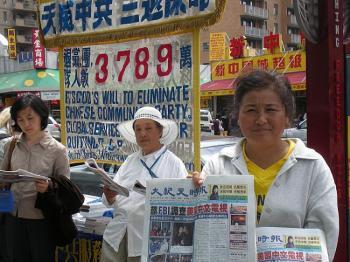Hoping to have a corrupt local official removed from office, residents of the Fanyu District in Guangzhou City, Guangdong Province started a peaceful sit-in and hunger strike in early September. Permission had been granted by the district civil administration bureau on September 11.
However, on the 12th, the Fanyu District government sent 1000 riot police with high-pressure water hoses to the village office, the site of the sit-in. The police objective was to forcibly remove all the incriminating accounting records that the villagers had tried to protect for more that 50 days. Forty-eight people were arrested and many others were injured.
Sending the Riot Squad for an Accounting Ledger
About 9:00 a.m. on September 12th, the Guangzhou Fanyu District government sent 63 police and fire vehicles carrying nearly 1000 policemen from the riot and public security squads. They sealed off all roads leading to Taishi village where the protest was held and turned high-pressure hoses from fire trucks on the protesters. The protesters, mostly women and senior citizens, were peacefully protecting the evidence stored in the accounting department. The police brutally beat some women who would not leave and arrested 48 people.
A Taishi villager told our reporter, “We figured the government would come and take the financial documents, but we never imagined they would use force. They aimed high-pressure hoses at 60 year-old women! Some elderly people fainted at the scene. We villagers are still not sure what account books they took or what financial records were changed.”
When the reporter asked the injured if they were afraid and what they would do in the future, all of them replied, “We’re not afraid! We will persist until we get results!”
Fanyu Government Goes Back on its Word
Taishi is a small village of only about 2,070 people. Disgruntled farmers there have waged a struggle to impeach a corrupt official. After proposing on July 29th to impeach the official, the villagers found that he had tried to change the records in the municipal accounting book. So they had no choice but to guard the book, since it was the main evidence. They did this peacefully for 50 days.
The village has more than 4,500 acres of land, with 3,000 being held in a joint stock venture by the village committee. The rest is divided among the villagers, so that each household has only nine tenths of an acre. Presently, this small plot forms a large part of their income, which also consists of the joint venture’s bonus and outside wages.
Legally, all the proceeds from the joint venture, consisting of rent for the land, interest and the bonus, should belong to the villagers, its stockholders, and form an important part of the villagers’ income. But they are currently not receiving their proper share, and the rent, nearly 100 million yuan (Chinese currency), seem to have vanished.
The Director of the village office, Chen Jinshen, who has only been in office for three years, like everyone else, is only supposed to have the nine tenths of an acre and one house. But Chen now owns several small buildings and cars, whereas the villagers each only receive several hundred yuan from the bonus a year.
To protest, the villagers went on a hunger strike. Their appeal for a democratic election to the office drew attention from the global media and support from democracy advocates in China. Finally, the government signed a compromise and agreed to have the accounts audited. Chen’s impeachment took effect on September 11.
But the very next day, the riot squad, with high-pressure hoses, was sent in to disperse the villagers. The government risked global condemnation in order to retrieve the accounting ledger.
What official, in a small village, has the power to send in 1,000 police? And what connection does such a powerful person have with the Taishi account book? The book’s whereabouts remain unknown, and the facts of this scandal may never be revealed.
By using legal methods and non-violent resistance, the Taishi village farmers stand in sharp contrast to the heavy-handed method of the local government. The incident has drawn global attention and the support from pro-democracy advocates in China and has shown the nonviolent spirit of the Chinese people in the countryside.



